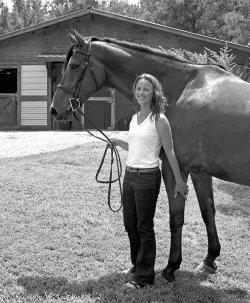Christopher E. Nelson











 September 2009
September 2009
There’s a misconception, Melissa Jones Sarle says, that riding a horse is simply staying atop an animal as it does all the work. There’s so much more to it. “It’s sophisticated muscle control and a lot of eye-hand coordination,” she says, adding that riders use each arm independently along with their legs, ankles, heels and other body parts in a nuanced communication.
“It’s not just kicking (the horse) and pulling (reins). Riding requires a lot of physical control, but I think it also requires a lot of emotional empathy. You know, you have to be kind to a horse to get it to perform for you.”
Melissa has performed with horses as a professional rider and trainer in the hunter/jumper world since 1995. She has competed with success, including winning the $40,000 Footings Unlimited Grand Prix at Commonwealth Park in Culpeper, Virginia, in July of 2007. For the most part, since September of 2006, though, she has owned and operated Paramount Show Stables in Raleigh, where she and her staff have about 20 students and 21 horses in a full training program.
The Paramount Show Stables approach includes instruction in hunter/jumper and dressage in preparation for a “fairly high level” of shows, Melissa says. Riders are trained individually, not in groups, and the owner or trainer rides the horse five days a week. “They’re not just getting lessons in how to ride a horse. We’re teaching the horse to behave better, and then we’re teaching them how to better ride the horse.”
Melissa’s affinity for horses goes back to the age of 9, she says, though she’s always been the outdoorsy, athletic type and “wild about animals.” As a young child, she was not allowed to have a pet – “They weren’t trying to be mean, it just wasn’t part of their lifestyle,” she says of her parents – though eventually she had gerbils (one at a time and in the basement) and a cat with a bad attitude.
Her older sister has more of an artistic bent and Melissa gravitated toward athletics, partly, she says, as a means of asserting her individuality. She pursued basketball, track, soccer, ice skating and gymnastics through the years but, to her, nothing is quite like riding a horse.
“It’s like it’s in your core,” she says. “It’s not a job for me. It’s a lifestyle. It’s really all I ever think about. … My husband (an architect) does not have the same affliction.”
When she was 12 and growing up in the small central Massachusetts town of Lunenburg, she got a job cleaning stalls at a local stable in exchange for riding lessons. At 19, as a freshman at Mount Holyoke College, she bought her first horse in partnership with the director of the school’s equestrian program. The program director had free use of a stall, and Melissa was already a trainer, teaching students in the work-study program. “It was not a very good horse,” she says, but in time they sold it at a profit and Melissa bought her own ride.
Today, Melissa has five cats and three dogs in addition to the horses at Paramount, which has covered and open-air riding arenas, two barns, grooming area, tack room and offices on about 11 acres within the city limits off Old Milburnie Road.
Prior to buying Paramount, which has been in operation since 1997, Melissa, now 32, managed a farm in Apex for three years. She came to the Triangle from Camden, SC, where she moved for her first riding and training job after college.
Though she had a plan and was confident in her abilities, she recognized that ownership was a leap. “It was a huge risk,” she says. “Even now, I have a huge mortgage on this place, but I write the check and turn my head. … I would be kidding you if I didn’t say I was scared a lot of the time, but you just push on.”
She admits that those who can afford private riding lessons are less affected by economic downturns, and says travel to shows has fallen a little but her clientele has been steady.
Since she aims to train competitive riders, Melissa doesn’t accept beginning students. Still, younger beginners do better, she says, because they have less fear.
Anyone who’s fit and has reasonable eye-hand coordination can learn to ride, but the best have natural ability, she says. “Because when you’re riding, you’re dealing with a thinking, breathing, living being. It takes something that not everyone has.
“It’s easy enough to learn how to ride, but it’s very difficult and time consuming to learn to ride well.”

She's So Skirt!